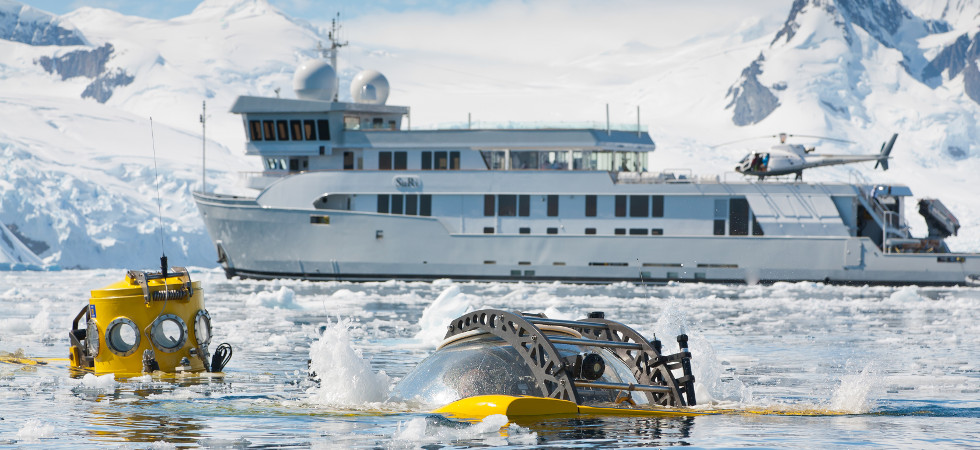We take a look at why superyacht owners are travelling further, playing harder and even developing an eco-conscience.
Superyachts have long been the ultimate passion asset for the ultra-wealthy. However, ultra-high-net-worth individuals (UHNWIs) are no longer happy merely spending time moored off the south coast of France, sipping cocktails in the sunshine. Instead, superyachts are increasingly being used more adventurously, to travel further afield in style.
Some owners have even taken their boats on expeditions as far afield as Antarctica. An early trendsetter was perhaps Bill Gates who, alongside his late friend and business partner Paul Allen, cruised the Antarctic aboard the superyacht Octopus, back in 2007.
Those with the means to do so are increasingly seeking fulfilment and unique experiences by pushing their boundaries and trying new things. This means that instead of being mere pleasure craft, superyachts are becoming private exploration vessels.
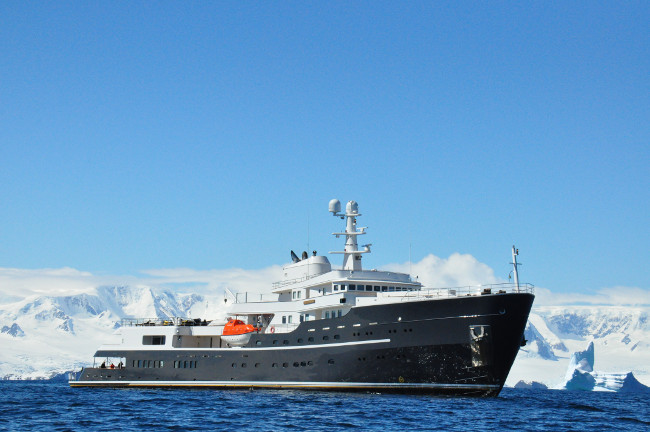
Some superyachts are purpose-built as such. Others are converted from old working vessels, upgraded to a luxurious standard. Legend is a prime example. This 77m-long, former Soviet icebreaker, has been transformed into a private exploration yacht, capable of taking on the most challenging ocean and arctic conditions. As well as offering the height of elegance and comfort to its passengers, Legend is tough enough to explore the most remote nooks and crannies of the planet.
Developments in technology are facilitating this trend, as advanced navigation, radar and sonar equipment now helps to give voyagers access to increasingly exotic locations. Thanks to a new breed of long-range explorer yachts, some of world’s most successful people can venture into previously uncharted waters.
However, you don’t have to own a superyacht in order to go on such adventures. It’s possible to charter yachts, or to travel with the help of a specialist luxury adventure travel company, such as Cookson Adventures.
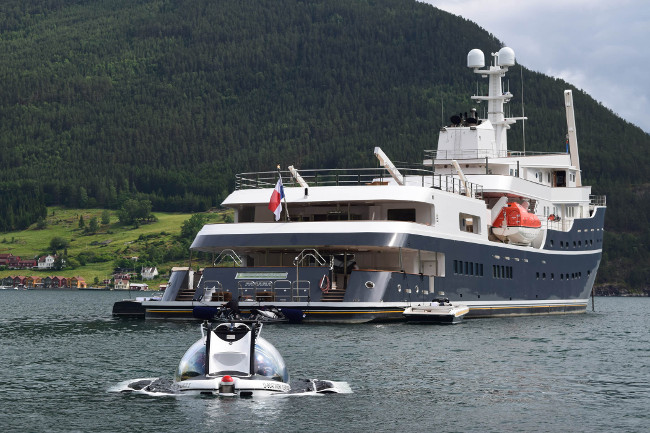
Cookson has a dedicated superyacht team that handcrafts unique marine-based expeditions. The company recently took Legend on a tour of the Antarctic Peninsula, where guests enjoyed helicopter tours, dives in a submersible, trekking on ice and even a collaboration with local scientists. Such voyages really are the trip of a lifetime.
Yet, they are not all about adventure. For many guests, building a deeper understanding of our world is a key motivation for undertaking such voyages. To this end, Cookson makes possible encounters with leading scientists, biologists, conservationists, archaeologists and other experts, through its vast network of experts. This helps to provide immersive experiences for guests which are not only physically, but also intellectually, stimulating. Conservation is a priority for Cookson. Guests can get deep insights into research projects, and efforts to protect the local ecosystem, to help them gain a real understanding of the remote locations they are experiencing.
Adam Sebba, CEO of Cookson Adventures, told Luxury Lifestyle Magazine: “As concerns about climate change and environmental degradation grow by the day, it is encouraging that those with the means to empower positive change are actively seeking out meaningful experiences in nature. We are increasingly seeing our guests moved to contribute to pioneering conservation work across the world, to projects that are helping to preserve the beauty of the delicate ecosystems we are visiting.”
For example, as part of its recent trip to Antarctica, Cookson was able to arrange for its client to make a significant donation to a project that has resulted in the discovery of a new species of killer whale. Across a variety of other trips, contributions have been made to many worthy projects, from shark tagging deep in the Pacific Ocean to rehoming baby giant tortoises in the Galapagos Islands.
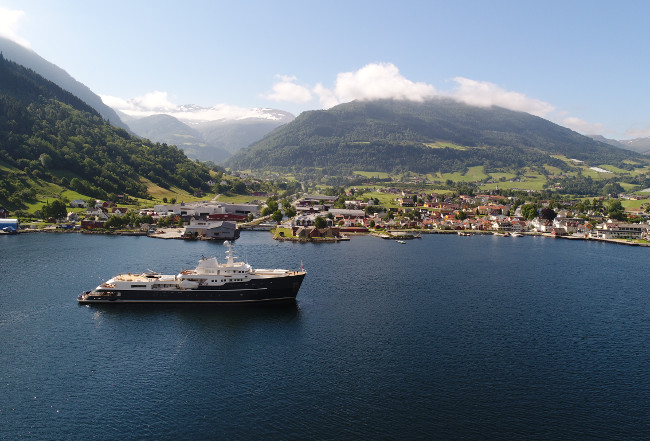
As well as an increasing trend towards more adventurous voyages, there are also more prosaic reasons why owners of superyachts are increasingly shunning their traditional European haunts. Some owners are keeping their yachts outside the EU for longer each year due to a perception that the EU VAT rules are becoming more hostile towards the ownership structures and tax reliefs that have traditionally been available to the owners and operators of superyachts. This reticence isn’t altogether surprising, given some of the rhetoric that has come from Pierre Moscovici, the EU Commissioner for Economic and Financial Affairs, Taxation and Customs Union.
What is clear, however, is that Mr Moscovici’s ‘crackdown’ has come at a time when the trend amongst UHNWIs to invest their money in once-in-a-lifetime experiences looks set to take off. These expeditions are, however, invariably complex and require specialist knowledge and expertise.
Arranging them means navigating a plethora of issues relating to logistics, permits, visas and – above all – locating crew with the expertise needed to operate safely in such remote and challenging environments. Yet with the right advice, sound planning and legal and operational due diligence carried out well ahead of time, companies such as Cookson Adventures can arrange every aspect of such unique and unforgettable experiences.
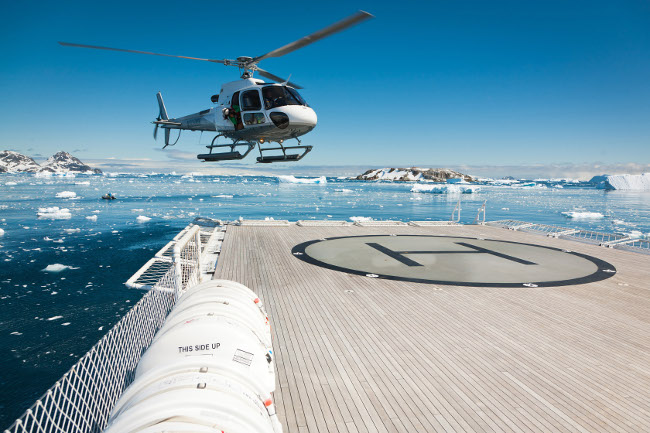
Adam Ramlugon, partner and superyacht specialist at Luxury Asset Law Firm Bargate Murray, has worked alongside the team at Cookson Adventures for a number of years, helping them to navigate the legal and regulatory issues that arise when planning these unique expeditions.
“It is always a pleasure to work with the team at Cookson,” he told Luxury Lifestyle Magazine.
“The projects we have worked on together really are unique and never fail to present interesting issues for us to solve. I also take my hat off to Cookson and its clients for having the ambition and vision to put these expeditions together and really see the world. These expeditions are not merely holidays. They are transformative experiences which open hearts and minds. They are also part of a shift in consciousness amongst the global elite, who are becoming ever more environmentally aware, and so are becoming increasingly active in creating drives towards conservation and sustainability.”
Image credit at the very top of the article: Cookson Adventures












